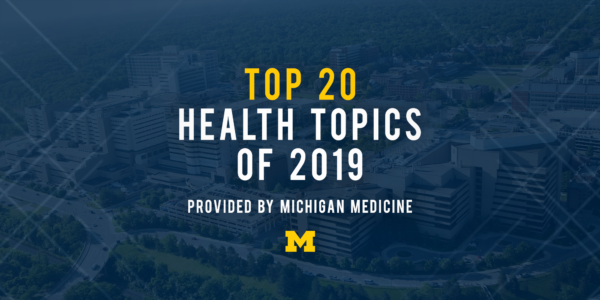Melatonin, medical marijuana, and measles are just a few of the topics the experts at Michigan Medicine discussed in 2019. Here are 20 of Michigan Medicine’s most viewed blogs this year.
Study: Therapy Completely Clears HPV in One-Third of Cervical Precancers
Clinical trial shows promise of immune treatment against HPV infections that lead to cancer.
Keto Diets and Heart Health: What’s the Risk?
A Michigan Medicine dietician explains how the popular low-carb regimen can get results — as well as related risks everyone should know.
What’s Causing the Latest Measles Outbreak?
A disease the federal government declared “eliminated” nearly two decades ago is surfacing again. Here’s why — and what to do.
What’s the Difference Between Norovirus and Flu?
The seasonal return of two unpleasant viruses offers a reminder for good hygiene and vigilance. Here’s how to stop the spread of flu and increase norovirus prevention.
Why Women Get Autoimmune Diseases Far More Often Than Men
Researchers cause a lupus-like disease in mice by amplifying the amount of a single “master regulator” factor — suggesting both a root cause for known differences between the sexes and a target for new treatments.
The Best Diets for Cancer Patients and Cancer Survivors
A U-M cancer researcher looks at the five most popular diets today that include the nutrients known to help reduce a person’s risk of getting cancer or prevent a recurrence.
Gene Therapy Treatment Targets Rare Mutation Tied to Blindness
Advances in gene therapy are yielding new options for treating inherited retinal degenerations, giving specialists new tools — and new hope for patients and families.
Are Melatonin Supplements Safe?
A Michigan Medicine expert explains what we know and don’t know about the hormone supplement that’s growing in popularity.
What Drives Patients to Use Medical Marijuana: Mostly Chronic Pain
New study seeks to understand whether people are using cannabis for evidence-based reasons.
Which Blood Thinner is Right for You?
A U-M cardiologist weighs the pros and cons of anticoagulant medication for atrial fibrillation patients.
Two Ways to Reduce Blood Thinner Risks That Lead to GI Bleeding
A new paper identifies strategies that providers might use to help their patients better balance the risks and benefits of anticoagulants.
Are You Properly Storing Your Breast Milk and Formula?
From the 5:5:5 rule and beyond, a Michigan Medicine expert breaks down guidelines to safely store, thaw and heat breast milk or formula.
Getting Leftover Surgery Opioids Out of Harm’s Way? It’s in the Bag
A randomized trial shows that providing patients with special disposal bags doubled the odds they would safely dump their leftover opioid pain medicine.
Expanding Medicaid Means Health Problems Get Found and Health Improves, Study Finds
Among those with common chronic diseases, 42% said they got diagnosed after enrolling in expanded Medicaid.
Doctors Are Seeing More Alcoholic Liver Disease in Young Adults
Alcohol use disorders have also increased over the last decade, with an 80 percent spike among women.
App-Driven Care for Parents of Children Undergoing Surgery
A pilot study of families of children going home after tonsil surgery finds that a smartphone app may reduce clinic calls and simplify care instructions for parents.
Opioid-Related Suicides and Overdose Deaths Have More Than Doubled Since 2000
Turning the tide demands improvements to pain care, mental health care and medication-assisted opioid addiction care, U-M researchers say in a new report.
Doctors Find Grill Brush Lodged in Woman’s Throat for Months
A single hotdog bite landed Linda Pelham in the hospital unable to breathe, speak or swallow. After six months of agony, Michigan Medicine physicians discovered a wire grill brush bristle stuck in her throat.
Half of U.S. Children with Mental Health Disorders Are Not Treated
Study: 1 in 7 children and teens have at least one treatable mental health disorder; treatment and prevalence rates vary considerably by state.
Ringing in the Ears: Where is That Sound Coming From?
A U-M expert in tinnitus, or ringing in the ears, discusses progress made in resolving the common problem.










